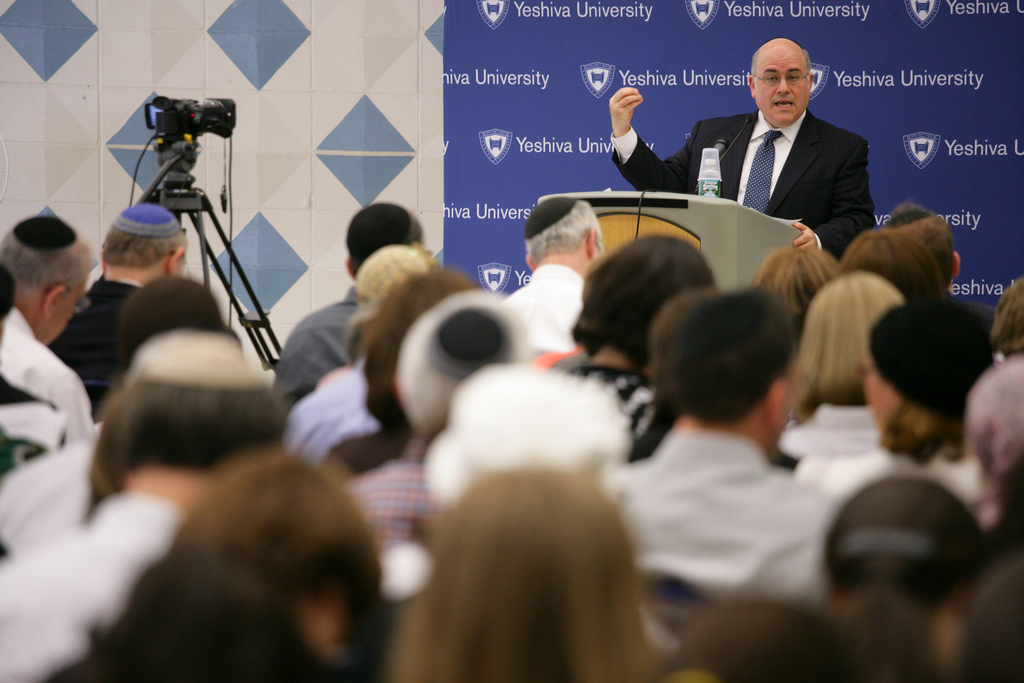Exile and redemption: YU learning program explores timely topic
By Yaffi Spodek
Issue of May 8, 2009 / 14 Iyar 5769
A Yom Iyun at Yeshiva University on April 26 drew 500 men and women eager to learn different perspectives on "Exile and Redemption in Tanach
and Jewish History," an event organized by the Center for the Jewish Future featuring 21 dynamic rabbis and educators.
The day of learning was dedicated to the memory of David Rottenstreich z"l, a 20-year-old YU student from Queens who fell ill and died suddenly on Erev Pesach. In opening remarks, YU Rosh Yeshiva Rabbi Zvi Sobolofsky spoke about David, who had been his student, and the love of Torah he shared with all around him in his short span of time in this world.
Rabbi Jacob J. Schacter introduced the Yom Iyun with a discourse on how exile and redemption can be viewed today in light of the establishment of Israel, and how to reconcile the apparent contradiction that exists between the two concepts. He explained that Israel is a place where there is “a dualism ... an intersection of both exile and redemption simultaneously.”
There seems to be a fluctuation between these two states of existence, he explained. According to him, it is “manifestly obvious” that the redemption has not yet arrived, and that we are living in an “imperfect reality” where the external threats to the State of Israel are very real. He referred to Israel as an “unexpected state.” We now find ourselves in the exile that followed the destruction of Bayit Sheini (the second Temple) which should have ended with the rebuilding of the third Temple, as our ancestors intended.
Although we are now in a different situation than we were prior to 1948, “what is the theological understanding of the state of Israel?” Rabbi Schacter asked. He discussed the three oaths found in Masechet Ketuvot determining Israel’s return to Zion, and cited different opinions on whether or not they still apply today, as some people believe we cannot initiate the return to and must wait passively, while others disagree. Since Israel is now a Jewish state and not under the authority of “others,” these oaths may no longer be applicable, and so we may have permission to rebuild without being in violation of the oath saying that we cannot rebel. This is the argument for the modern day Zionist movement.
Rabbi Schacter cited a letter from Rav Herzog, the late Chief Rabbi of Israel, which was written several months before the establishment of the State, in which he refers to Israel as the “atchalta d'geulah,” the beginning of the redemption. This shows that “we’re on the way to redemption ... in the paradigm of geulah,” Rabbi Schacter explained. He also brought the text of the tefilah l'shlom hamedina (prayer for peace in Israel), highlighting composer Shai Agnon’s words of “reishit tzemichat geulateinu,” literally translated as beginning of the blossoming of the redemption.
“We are not used to this ‘metzius'’(reality) and so we solve this theological conundrum by referring to it in redemptive language, while acknowledging that redemption has not yet arrived,” Rabbi Schacter explained. “It’s hard to define ... how to frame a reality that is exile and redemption at the same time... We’re as far away as we can be [from redemption] but we are framing it in a category couched in redemptive language.”
Following Rabbi Schacter's words, participants were free to attend any of the 20 shiurim offered throughout the day during four hour-long time slots. Speakers included Rabbi Menachem Leibtag, Rabbi David Berger, Rabbi Chaim Angel, Dr. Shawn Zelig Aster, Dr. Ephraim Kanarfogel, Dr. Naomi Grunhaus, Dr. Shira Weiss, Mrs. Elana Stein Hain, and Mrs. Nechama Price among other top Tanach scholars speaking on a range of topics, from the Messianic era to the prophecies of Isaiah to Rav Kook. In addition to the Torah insights offered, YU provided breakfast and lunch to all participants, who were asked to pay a modest donation fee upon entry. The day of learning concluded at 3:00 p.m. with Mincha services. Many of the day's shiurim were recorded and can be viewed and heard on the Internet at yutorah.com.
“I really enjoyed all the shiurim, especially Nechama Price’s, ‘Splitting the Seas of Tanach,’ which drew a lot of physical parallels between the texts and corresponding ideas, showing how all of Tanach is inter-related,” said Ayelet Mael of Lawrence, who attended the classes with her mother, Lynn.
Mael, 22, a student at YU's Bernard Revel Graduate School of Jewish Studies, is also a regular attendee of the Millie Arbisfeld Midreshet Yom Rishon series which takes place every Sunday at YU, featuring two shiurim offered to women, with a parallel program for men known as the Abraham Arbisfeld Kollel Yom Rishon. The Yimei Iyun, which are organized by students several times a year, are an extension of these popular Sunday programs.

 49.0°,
Mostly Cloudy
49.0°,
Mostly Cloudy 




